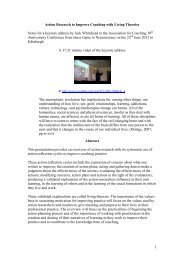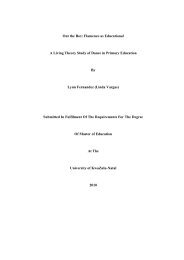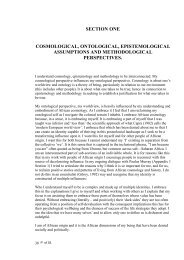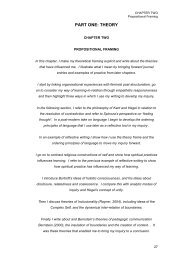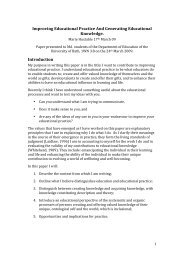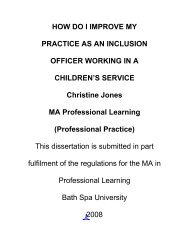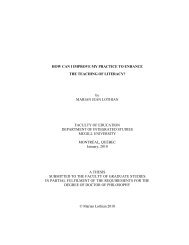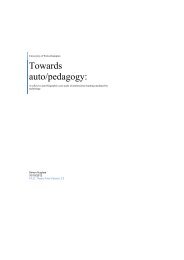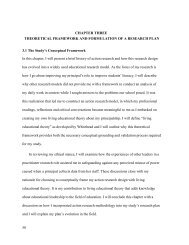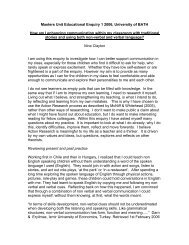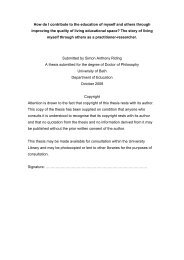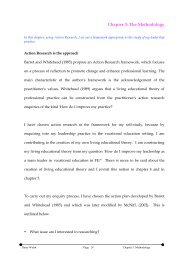Action research transcends constraints of poverty in elementary ...
Action research transcends constraints of poverty in elementary ...
Action research transcends constraints of poverty in elementary ...
You also want an ePaper? Increase the reach of your titles
YUMPU automatically turns print PDFs into web optimized ePapers that Google loves.
2. to help others to do so too. (p.1)In our use <strong>of</strong> visual narratives and empathetic resonance (should adef<strong>in</strong>ition <strong>of</strong> these go here from the other paper?) <strong>in</strong> communicat<strong>in</strong>g themean<strong>in</strong>gs <strong>of</strong> energy-flow<strong>in</strong>g values as explanatory pr<strong>in</strong>ciples <strong>in</strong>explanations <strong>of</strong> our educational <strong>in</strong>fluence, we are claim<strong>in</strong>g that such<strong>in</strong>clusional values <strong>in</strong> a culture <strong>of</strong> <strong>in</strong>quiry can transform what counts aseducational knowledge <strong>in</strong> the Academy and that is explicitly engag<strong>in</strong>gwith transcend<strong>in</strong>g different forms <strong>of</strong> <strong>poverty</strong>.The perspectives focus on the scholarly significance <strong>of</strong> the presentation <strong>in</strong>contribut<strong>in</strong>g to a new epistemology for the new scholarship throughaction <strong>research</strong> (Schön, 1995). Through these perspectives we emphasizethe importance <strong>of</strong> recogniz<strong>in</strong>g the <strong>in</strong>fluence <strong>of</strong> normative background <strong>in</strong>realiz<strong>in</strong>g the values that carry hope for the future <strong>of</strong> humanity. We focuson the significance <strong>of</strong> collaboration to provide a supportive environmentfor educational <strong>research</strong> <strong>in</strong>quiries and on the importance <strong>of</strong> strengthen<strong>in</strong>gthe social validity <strong>of</strong> our communications as educational <strong>research</strong>ers.The works <strong>of</strong> Whitehead and McNiff are sem<strong>in</strong>al to our <strong>research</strong> process.Whitehead and McNiff (2010) affirm that:The idea <strong>of</strong> <strong>in</strong>fluence is at the heart <strong>of</strong> action <strong>research</strong>. Becauseaction <strong>research</strong> is always conducted with other people whoconstitute social situations, and because those other people canth<strong>in</strong>k for themselves, the way to <strong>in</strong>fluence the trajectories <strong>of</strong>social change is to encourage them to act differently, through<strong>in</strong>fluenc<strong>in</strong>g their th<strong>in</strong>k<strong>in</strong>g (p. 73).Draw<strong>in</strong>g on the perspectives <strong>of</strong> education <strong>research</strong> assists the <strong>research</strong>er<strong>in</strong> situat<strong>in</strong>g their <strong>research</strong> with<strong>in</strong> the field <strong>of</strong> educational <strong>research</strong> andprovides language to help them expla<strong>in</strong> their embodied knowledge. Thedist<strong>in</strong>ction we hold between education <strong>research</strong>ers and educational<strong>research</strong>ers is that education <strong>research</strong>ers ground their <strong>in</strong>quiries <strong>in</strong>discipl<strong>in</strong>es <strong>of</strong> education such as the philosophy, psychology, history andsociology <strong>of</strong> education and <strong>in</strong> fields <strong>of</strong> <strong>in</strong>quiry such as management,leadership, economics, politics and theology, while educational<strong>research</strong>ers produce validated explanations <strong>of</strong> educational <strong>in</strong>fluences <strong>in</strong>learn<strong>in</strong>g. These <strong>in</strong>clude explanations <strong>of</strong> educational <strong>in</strong>fluence <strong>in</strong> the<strong>in</strong>dividual’s learn<strong>in</strong>g, <strong>in</strong> the learn<strong>in</strong>g <strong>of</strong> others and <strong>in</strong> the learn<strong>in</strong>g <strong>of</strong> thesocial formations <strong>in</strong> which we live and work.We focus on the importance <strong>of</strong> humility <strong>in</strong> the support <strong>of</strong> learners (Buber,1923) and the knowledge that we are all fallible <strong>in</strong> our know<strong>in</strong>g (Thayer-Bacon, 2003). We <strong>in</strong>clude N<strong>of</strong>fke’s perspective about the need to address



